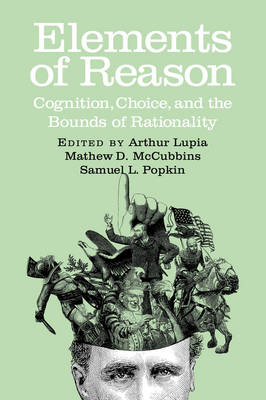
Elements of Reason
Cambridge University Press (Verlag)
978-0-521-65332-9 (ISBN)
Many social scientists want to explain why people do what they do. A barrier to constructing such explanations used to be a lack of information on the relationship between cognition and choice. Now, recent advances in cognitive science, economics, political science, and psychology have clarified this relationship. In Elements of Reason, eighteen scholars from across the social sciences use these advances to uncover the cognitive foundations of social decision making. They answer tough questions about how people see and process information and provide new explanations of how basic human needs, the environment, and past experiences combine to affect human choices. Elements of Reason is written for a broad audience and should be read by anyone for whom 'Why do people do what they do?' is an important question. It is the rare book that transforms abstract debates about rationality and reason into empirically relevant explanations of how people choose.
1. Beyond rationality: reason and the study of politics Arthur Lupia, Mathew D. McCubbins and Samuel L. Popkin; Part I. External Elements of Reason: 2. Shared mental models: ideologies and institutions Arthur T. Denzau and Douglass C. North; 3. The institutional foundations of political competence: how citizens learn what they need to know Arthur Lupia and Mathew D. McCubbins; 4. Taking sides: a fixed choice theory of political reasoning Paul Sniderman; 5. How people reason about ethics Norman Frohlich and Joe Oppenheimer; 6. Who says what? Source credibility as a mediator of campaign advertising Shanto Iyengar and Nicholas A. Valentino; 7. Affect as information: the role of public mood in political reasoning Wendy M. Rahn; Part II. Internal Elements of Reason: 8. Reconsidering the rational public: cognition, heuristics, and mass opinion James H. Kuklinski and Paul J. Quirk; 9. Three steps toward a theory of motivated political reasoning Milton Lodge and Charles Taber; 10. Knowledge, trust, and international reasoning Samuel L. Popkin and Michael A. Dimock; 11. Coping with tradeoffs: psychological constraints and political implications Philip E. Tetlock; 12. Backstage cognition in reason and choice Mark Turner; 13. Constructing a theory of reasoning: choice, constraints, and context Arthur Lupia, Mathew D. McCubbins and Samuel L. Popkin.
| Erscheint lt. Verlag | 9.10.2000 |
|---|---|
| Reihe/Serie | Cambridge Studies in Public Opinion and Political Psychology |
| Zusatzinfo | 13 Tables, unspecified; 25 Line drawings, unspecified |
| Verlagsort | Cambridge |
| Sprache | englisch |
| Maße | 152 x 229 mm |
| Gewicht | 510 g |
| Themenwelt | Sozialwissenschaften ► Politik / Verwaltung ► Politische Theorie |
| ISBN-10 | 0-521-65332-0 / 0521653320 |
| ISBN-13 | 978-0-521-65332-9 / 9780521653329 |
| Zustand | Neuware |
| Haben Sie eine Frage zum Produkt? |
aus dem Bereich


